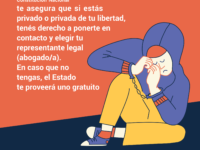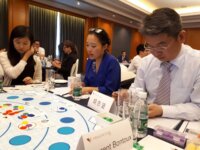The Rosselkhoznadzor has developed an artificial intelligence model that can detect violations in all production chains of animal products in order to reduce the proportion of counterfeit and falsified products of animal origin on the market as much as possible. The innovation is beneficial to a healthy society, conscientious agricultural producers and the state.
Artificial intelligence methods for detecting violations have not been previously applied by the Rosselkhoznadzor.
Innovation Tag: Methods and Tools
"Defensores" is a platform designed to provide public defenders with a tool to register allegations of torture. This project was carried out in partnership with two key actors in the subject: The Ministry of Public Defense (MDP) and the National Mechanism for Prevention against Torture (MNP). Its implementation facilitates the effective and permanent monitoring of torture by public defenders and generates qualified information for different institutions and society in general. It's the first…
The Scenario Exploration System was developed to facilitate the application of futures thinking to policy-making originally geared at engaging EU policy-makers with foresight scenarios very easily.
The tool operates as a multi-role board game that makes participants naturally grasp complex opportunities and constraints in a future-oriented perspective. Never before had a tool been able to facilitate the uptake of foresight for policy-making and systemic thinking to such an extent.
Recruit Smarter is a multi-sector initiative of the Victorian Government and Melbourne University to develop inclusive recruitment practices and address unconscious bias in recruitment.
Internationally, Recruit Smarter is the first initiative of its kind, contributing findings to a growing body of research demonstrating the benefits of inclusive workplaces.
46 organisations across the public, private, non-government, and research sectors contributed to Recruit Smarter and its findings.
Nudge Türkiye undertook a project to increase the uptake of government subsidies by SMEs. Analysis showed our subsidies were used by a limited number of big companies, and government could reach the SMEs who need financial support the most. By interacting more closely with the firms, they clarified the pain points for the SMEs. Based on firms' feedback, organisers created a user-friendly website for explaining subsidies, and sent over 30,000 emails that used behavioural messages to nonapplicant…
We created the BizLab, Human Centred Design (HCD) Training Academy to develop skills public servants will need for the future and create a citizen-centred culture in the Australian Public Service.
This is not just another training course.
We not only train participants in HCD tools and techniques, but we make that learning stick with our unique Alumni support system
Digital Lithuania Academy is an online learning platform that aims to guide the country’s public sector through the digital transformation. It seeks to immerse public servants in digital practices relevant to their work, and upgrade their professional profiles through a highly personalized learning pathway. By becoming increasingly tech-savvy, public servants have the chance to vastly increase their efficiency, find innovative ways of working, and deliver better public services to citizens.
The Ministry of Possibilities is a virtual ministry created to incubate and solve the systemic impossibilities of government.
It works by creating time-bound departments experimenting together to ask impossible questions and disrupt the conventional systems with leapfrog solutions that are yet to be explored
Its focus areas & mandate are:
To IDENTIFY impossibilities
To INCUBATE virtual, timebound departments/teams to solve and explore the impossibilities
To EDUCATE and train on the mindset of…
Who gets to set the direction of travel has been identified as a key concern of challenge led policy. Utilising an online crowdsourcing tool, the challenge prize Solution 100 provided a novel approach to addressing this question. By crowdsourcing the challenge formulation, the competition organisers built legitimacy for the prize along with a deep understanding of the challenge that was to be addressed. The chosen method combined knowledge gained through crowdsourcing and expert panels.
Informed Participation is a unique way to bring the public into government decision making. It gives government a method to solve complex issues with the public in a way that gives them a meaningful role in balancing competing interests. Public policy is becoming increasingly complex and trust in government is declining, so new innovative ways of engaging with citizens is needed. This method shifts engagement from obtaining buy-in to building ownership and creates more legitimate solutions.


